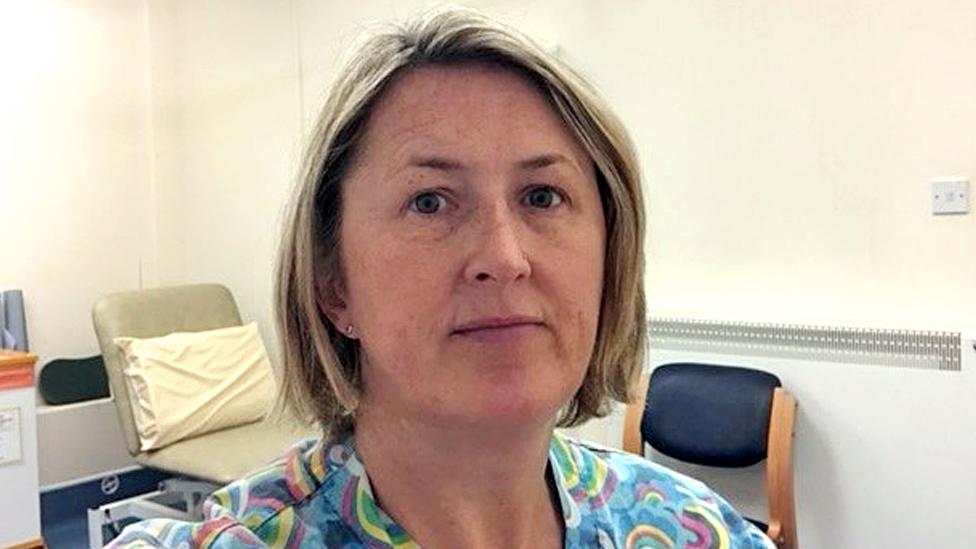Workers rush to take second jobs: 'I felt I had no choice'
- Published

Jude Harford took on a second job in April to boost her income
Jude Harford says she would rather not have a second job, especially as she has young children, but as living costs soar she felt she had no choice.
"Everything is ridiculously expensive right now," the mum-of-two from Poole says. "We need the extra money."
Research seen by the BBC suggests millions of people have also been forced to take on additional jobs, due to the rising cost of living.
The Royal London report surveyed 4,000 UK adults.
Ms Harford, who is a part-time nurse, took on a second job with an energy company in April to boost her income.
"It was a double-edged thing," she says. "It was to make sure we have a decent quality of life now, but also about future planning, for our financial security."
The job at the energy firm pays much better than her nursing job. It also offers flexible hours, which means she is able to pick up her children, aged 10 and 14, after school. But she still wishes she did not have to do it.
"I felt I had no choice," she says. "If I didn't have the stress of having to work a second job, I could be around the kids more, which is important while they're still young."
Ms Harford's experience is not unique, according to research by insurer Royal London.
The report found 16% of workers they surveyed have taken on an additional job to help pay for the cost of living increases. If true across the UK, that would equate to 5.2 million people.
A further 30% of people asked said they will need to do so if costs continue to rise.
Royal London's figures are higher than official data from the Office for National Statistics (ONS), external, which suggests around 1.2 million UK workers have second jobs. However, the ONS figures also suggest that number has been rising over the past two years.
The cost of living is increasing at its fastest rate in nearly 40 years, driven largely by the rising cost of food and energy.
Rising costs are eating into budgets, with price rises outstripping wages.
The survey by Royal London suggested that one job is not enough for millions of workers, as costs continue to soar.
However, working more hours is not a realistic option for many UK employees. Over a quarter (28%) of full-time employees already work over 48 hours a week, according to the research.
Out of those, a fifth say they are working more than 56 hours every week.
Despite working long hours or multiple jobs, many people are still finding it difficult to bring in enough money to cover bills. Nearly a third (31%) of people are already having to spend money they do not have, borrowing or using their bank overdraft, the research said.
'Tough winter ahead'
"We know that many households started reining in their spending six months ago as costs first started to rise, but with bills continuing to climb, it could be an incredibly tough winter ahead," said Sarah Pennells, consumer finance specialist at Royal London.
"While many have resorted to making significant spending adjustments, others, despite working all the hours they can, just can't keep their heads above water."
The government is limiting energy bill rises for all households for two years as Prime Minister Liz Truss tries to prevent widespread hardship.
A typical household energy bill will be capped at £2,500 annually until 2024, although bills will vary according to how much gas and electricity is used.
But despite this, many people are still concerned about their finances, Ms Pennells said.
"While the government's energy price freeze announcement will have brought relief, escalating costs across the board are deeply worrying, with only one in 10 adults confident they'll be able to cope financially," she said.
Rising costs are not just impacting finances. According to the survey, over three fifths (64%) of adults say they are overwhelmed.
But nearly three quarters (72%) of UK adults have not approached anyone for help with the cost of living crisis.
Royal London suggested contacting your energy provider if you are finding it hard to pay your energy bills, and contacting Citizens Advice if you cannot agree a plan.
National poverty charity Turn2us urged people who are worried about money to seek advice as soon as possible.
The charity also recommends speaking to a specialist debt organisations to get help with rising debt.

Have you had to take a second job to make ends meet? Share your experiences by emailing haveyoursay@bbc.co.uk, external.
Please include a contact number if you are willing to speak to a BBC journalist. You can also get in touch in the following ways:
WhatsApp: +44 7756 165803
Tweet: @BBC_HaveYourSay, external
Please read our terms & conditions and privacy policy
If you are reading this page and can't see the form you will need to visit the mobile version of the BBC website to submit your question or comment or you can email us at HaveYourSay@bbc.co.uk, external. Please include your name, age and location with any submission.
- Published14 September 2022

